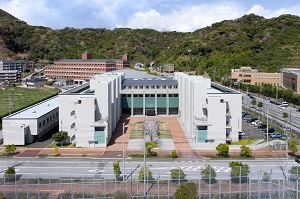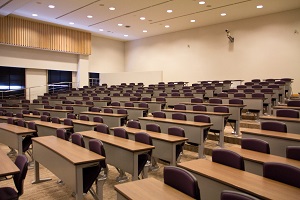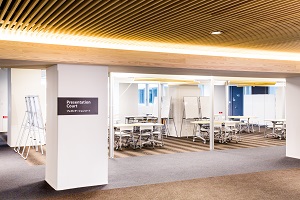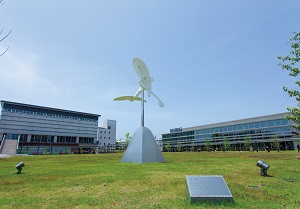本文
Master's Program Policies ~Graduate School of Nursing~
The Graduate School of Nursing emphasizes respect for all human life and its dignity, always striving to provide advanced academic expertise in a broad perspective, and develops students' academic foundation to become nursing professionals with high-level skills in diverse fields of education,research, and practice.
Admission Policy
The Master’s Program aims to produce personnel with high-level, practical skills and research capabilities in the field of nursing by equipping students with in-depth academic knowledge on the field from various and broad viewpoints.
We seek individuals with the following qualities.
- Fundamental knowledge on nursing theory and nursing research and skills in scientific thinking
- The ability to implement nursing by drawing on expert knowledge and technology
- Their own perspectives on nursing and people, and a sense of ethics, to develop the discipline of nursing science
- The ability to understand phenomena in nursing from diverse viewpoints and to explore nursing science
- The ability to continue to improve themselves as high-level practical nurses and educators throughout their lives
- An awareness of social changes and health issues, and aspirations to innovate in health care and welfare and nursing education
Selection Policy
The examination for admission to the Master’s Program consists of (1) an English language test, (2) essay writing, (3) a written examination on the candidate’s specialized area of study, and (4) an interview. A comprehensive evaluation is made based on the following.
English: Evaluate the candidate's ability to read and understand texts written in English, and to answer questions on the presented texts.
Essay: Evaluate the candidate's basic ability to contribute to the development of nursing science and abilities (including his/her direction) as a nursing professional.
Specialized area: Evaluate the candidate's fundamental comprehension, scientific thinking ability, professional nursing capabilities (expertise and basic practical skills), and consciousness of challenges in society and health.
Interview: Evaluate the candidate's capabilities as a nursing professional, fundamental intellectual abilities, and ability to conduct research. Interviews for the Practical Leader Program make extensive use of research plans submitted at the time of the interview.
Curriculum Policy
The Master’s Program includes the constituent programs of Clinical Nurse Specialist (Cns), Research Specialist, and Practical Leader, in accordance with the stated educational philosophy, in order to nurture deep academic knowledge from a broad perspective and to cultivate advanced professional practical skills and research abilities in the field of nursing. The curriculum of this program is organized as follows.
(Structure and Content)
・The Master’s Program’s curriculum is comprised of two sets of courses: Common Nursing Studies and Specialized Studies.
・The Cns Program consists of eight areas: Cancer Nursing, Chronic Care Nursing, Critical Care Nursing, Child Health Nursing, Gerontological Nursing, Psychiatric Mental Health Nursing, Family Health Nursing and Home Care Nursing. Classes in each are conducted through lectures, seminars, practicum, research tutorial seminars, and other courses required for eligibility to take the professional nurse certification examination.
・The Research Program consists of five areas: Adult Nursing (chronic phase), Child Health Nursing, Family Health Nursing, Community Health Nursing, Nursing Management. Classes in each area are conducted through lectures, seminars, and research tutorial seminars.
・The Practical Leader Program consists of two areas: Clinical Nursing and Public Health Nursing. Classes in each area are conducted through lectures, seminars, and research tutorial seminars.
・The Master’s Program also offers courses needed for eligibility to take the Examination for Certified Nursing Administrators, to acquire a specialized license for school nurses, and to acquire a specialized license for high school teachers of nursing.
(Sequence)
・Students in their first year take courses from Common Nursing Studies in the Cns Program, Research Program, and Practical Leader Program in order to form an academic foundation for nursing science. In the second half of the first year through the second year, they take specialized courses in their own areas of study and courses to acquire advanced competence in practicing expertise and research in the discipline of nursing science.
(Implementation)
・Guidance on course registration is provided to help students acquire the skills defined in the Diploma Policy and work toward their visions for the future, by suggesting coursework models for the Cns Program, Research Program, and Practical Leader Program.
・Lectures, seminars, practicum, and research guidance are provided to enable students to develop the aforementioned abilities. Methods include preview assignments, review assignments, group work, group discussions, active learning, and simulations. These aim to help students learn proactively and develop their expertise.
・As a rule, the Practical Leader Program offers courses on Saturdays and Sundays in accordance with the stipulations of the Special Provision of Article 14 of the Graduate School Establishment Standard.
(Evaluation)
・Achievement goals, criteria, and methods of evaluation for each lecture, seminar, and practicum are made known to all students by means of syllabi and practicum guides. Evaluation is conducted through self-assessment, course evaluation, and assessment by faculty members. Assessments are made at the time of students’ completion of their programs to determine whether they have attained the abilities stated in the Diploma Policy, in light of their performance on dissertations and oral presentations.
・To ensure the quality of education, assessments are conducted regarding the degree to which students have fulfilled the requirements of the Diploma Policy at the time of their completion of their respective programs, as well as the abilities they are expected to acquire, and the program’s curriculum.
Diploma Policy
The Master’s Program aims to cultivate students’ advanced professional practical skills and research abilities in the field of nursing science by equipping them with in-depth knowledge in a broad perspective.
Candidates who satisfy the following completion criteria are awarded the degree of Master of Science in Nursing.
・Students are able to conduct evidence-based, advanced nursing practice on the basis of theories of nursing science, knowledge and skills in related fields, and a high sense of ethics, by approaching individuals, families, and communities from multiple perspectives.
・Students are able to contribute to the formation and growth of communal cultures that promote good health, by collaborating with the people in the community to enable them to live their lives independently in the local community and living environment.
・Students are able to actively participate in meeting social needs and health issues, develop strategies to handle social circumstances by working jointly, with respect for the expertise of other professionals.
・Students are able to grasp phenomena in nursing, in practical nursing, education, and policy-making settings, from an interdisciplinary and research-based perspective, and are able to contribute as innovators by demonstrating logical thinking, leadership, and management abilities.
・Students are able to contribute to the pursuit and systematization of nursing science, with a clear understanding of the scientific and philosophical foundations of nursing practice and by conducting research on nursing.
・Students are able to employ a rich body of knowledge and cutting-edge information on international trends and diverse cultures to contribute to the exploration of the universality of nursing, as well as its systematization, from a global perspective.









